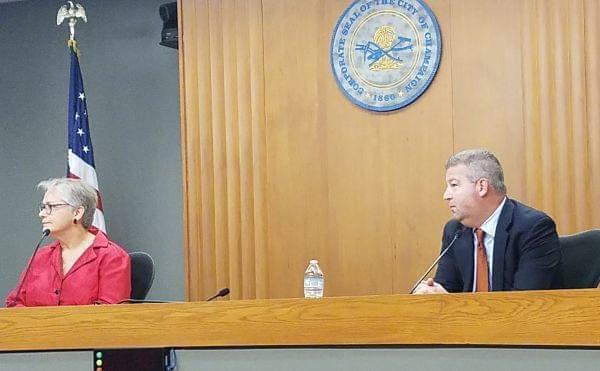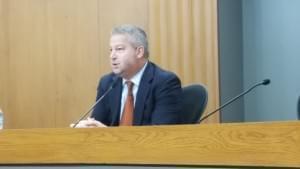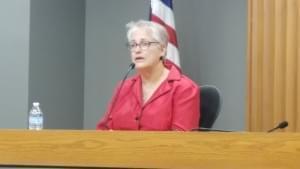County Executive Candidates Promise Progress For Champaign County

Democrat Darlene Kloeppel (L) and Republican Gordy Hulten (R) appear at a Champaign County Executive candidates' forum in Champaign on Sept. 21st. Jim Meadows/Illinois Public Media
This fall, voters in Champaign County are choosing their first county executive. The holder of this new elected office will preside over county board meetings, and be the day-to-day manager of county government. Before we meet Gordy Hulten and Darlene Kloeppel, the two candidates running for the post, it’s useful to get an idea of the county executive’s powers.
The year was 2006, and officials in Will County, located south and west of Chicago, were considering a proposal to outsource some of their highway work. The county board’s Republican majority said it would be cheaper for an outside firm to handle the painting of horizontal markings --- like stop bars and school crossings --- instead of having county highway workers do it. But Lawrence Walsh objected. Will County’s Democratic county executive, then serving his first term, said the move would lead to layoffs.
“And I told them that I would veto,” Walsh remembered. “And they would have to take two-thirds of the board members to override my veto. And it couldn’t be done. And so, we ended up moving in that direction, instead of outsourcing that project.”
The ability to veto county board actions is one of the notable powers available to an elected county executive. 20 states have counties where voters elect a county executive, sometimes called by different names, like county mayor. But in Illinois, only Will County has the post. (Cook County’s county board president is a similar post, but different from the county executive, in that Cook County has home rule powers).
But Will County will have company this fall, when Champaign County voters choose their first county executive, the result of a referendum approved in 2016. (Champaign County voters rejected county executive proposals in four previous elections in the 1980's and 1990's).
Darlene Kloeppel and Gordy Hulten are competing for election as Champaign County executive. And Hulten, the Republican candidate, said Champaign County has needed a county executive for a long time.

Republican candidate Gordy Hulten speaking at a candidates' forum in Champaign on September 21.
“I think it’s necessary because the county board has for decades, under the leadership of both parties, sort of struggled to make decisions in a common-sense, forward-thinking way, and instead would constantly find themselves riven by partisanship and by infighting,” said Hulten.
Hulten summed up the argument made by the Champaign County Farm Bureau and Chamber of Commerce, who organized a referendum for a county executive in 2016. The proposal passed with backing from local Republicans. But a Democrat was the first to enter the race for the office. That Democrat, Darlene Kloeppel said Champaign County voters are ready for the change.
“What I am hearing is that they are very interested in getting past the politics and trying to work on some vision that will help the county move forward,” said Kloeppel. “They understand the need for the political parties during the election process, but they are really hopeful that once the election occurs, that people can get past that, And that we can actually get some things done.”
Jim Meadows interviews County Executive Candidate Gordy Hulten (R) about his approach to this new office.Up to now, a county administrator has run Champaign County government day to day. But that administrator is hired by, and answers to, the county board. Champaign County’s new county executive will be elected by the voters, like a governor of a state. Gordie Hulten said if he’s elected, one of his priorities will be to strengthen county finances. He said those finances were damaged by the county’s money-losing nursing home. And now that the nursing home is being sold, Hulten said he wants to set those finances straight.
“I expect that a significant amount of the first term that I spend as county executive will be reexamining county financial operations,” said Hulten, “and reconfiguring them to try and repair the damage that’s been done by the nursing home over the years, and get us on a more modern, nimble footing, so that we can do the things that we need to do, in terms of improving our technology, and taking care of our facilities and providing the services that we need to provide to the citizens of Champaign County.”
Darlene Kloeppel said one of her focuses as county executive would be on Champaign County’s long-term planning. She said, the county’s planning process needs to be reorganized. Kloeppel wants a process that plans ahead for all parts of county government, six years at a time.
“We have a strategic plan,” said Kloeppel of the county’s current long-range planning. “It’s a two-year plan at this point in time. We have a ten-year facilities plan. We have a one or two or three year IT plan. And there’s no plan for revenue. Basically what we have is a wish list … and each year, we pick one or two or three that we can afford to do. And that’s not really a vision for where we’re going and it doesn’t give us a way to measure if we’re getting there.”
Jim Meadows interviews County Executive Candidate Darlene Kloeppel (D) about her approach to this new office.Kloeppel and Hulten also share goals in common, like adding mental health and drug treatment facilities to a consolidated county jail, and having an independent commission draw the next county board district map.
To work toward such goals, the Champaign County executive will have the veto power mentioned at the start of this story, but also the power to break tie votes, and propose budgets. Supporters of the office say those powers, plus a mandate that comes from being elected by the voters, should lead to decisive action, where a politically divided Champaign County Board has held back.
A Dissenting View In Will County
But has it worked out that way in Will County? Not according to Will County Board Speaker Jim Moustis.
“Things are not any more decisive (in Will County government) because there’s a county executive there,” said Moustis, whose position is analogous to that of a county board chairman. The Republican Moustis is not a fan of the office of county executive.
Moustis said county executives in Will County have had a tendency over the years to try to horn in on the county board’s legislative work. At the same time, he said the county executive’s supporters in Champaign County may be overrating the powers of the office.
“He can’t pass ordinances,” said Moustis of the powers available to County Executive Walsh.” He can’t pay a bill without the county board approving the budget. He can’t hire – there’s a few exceptions - can’t hire any personnel without advice and consent of the county board. If they think the county executive has any type of authority to pass anything on his own, they’re sadly mistaken.”
Promises To Work With The County Board
But the candidates for Champaign County executive are claiming another, albeit unwritten power for the office. That is the power of the county executive to essentially schmooze the county board, and persuade them to work with him or her towards common goals.
Darlene Kloeppel said she believes the change in status quo caused by the county executive’s post will be challenging for county board members. But she argued that her work in the past with executives during the merger of regional hospital systems into Provena Health gave her valuable experience in helping people manage change.

Democratic candidate Darlene Kloeppel speaking at a candidates' forum in Champaign on September 21.
"I expect that whenever you make a change that people are a little bit uncertain about how that will play out," said Kloeppel. "I think there will be some resistance. Change is hard. People sometimes even believe that they want change, and still, when it starts to happen, it's not quite the way they envisioned it, and so there's been more resistance. What I do think though, from what I've heard, most people would like to get along, in terms of trying to get things done,. And it certainly is easier to get along with people that you can communicate with. And so, myself, and I know several of the people who are running for the county board, have reached out across the aisle, or to other new members, to try to start to build those relationships, at least with conversation.”
Both Kloeppel and Hulten noted that it’s not just the county executive that will be new to Champaign County. When the new Champaign County Board is seated in December, many members will either be newly elected, or appointed in the past year. Many longtime members are leaving the board, or have already done so. Hulten says the resulting loss of institutional memory might actually help with the transition.
“So while the form of the county board will remain somewhat intact, the actual individual members are for the large part going to be brand new to the county board, at the same time that they are brand new to this county executive form of government,” said Hulten. “So I think that we can work through the issues that we’re going to encounter together, and sort of learn and grow into this new form of government collaboratively.”
But Will It Work?
Whether the county executive will bring a firmer direction to Champaign County government is still unknown. Republican County Board member Jim McGuire says he was initially wary of the county executive proposal. But now he’s more confident that it will be helpful.
“What (the county executive proposal) gave the voters the opportunity to do is to vote for someone who has an overall agenda for the whole county,” said McGuire after a recent county board meeting. “Sometimes, on this board especially, we have a very diverse group of county board members who represent a diverse group of districts … and they have different views of what they want to see happen.” McGuire says he hopes the county executive elected in November will represent a consensus of voters across the county on the direction they want Champaign County to take.
The Champaign County Board has been closely divided, ever since Democrats won a narrow majority on the body in 2000. Currently, their majority is 12-10. Three times since 2000, Democrats have split over their choice for county board chair, with a handful of Democrats joining with Republicans to elect an alternate Democrat to the post.
The first of the three was Barb Wysocki of Urbana, who served as county board chair in 2004-06. Wysocki says she hopes to be “pleasantly surprised” after the election by cooperation between the county board and the new county executive. But she says things could easily go the other way.
“I think it’s quite possible that the county board could really entrench themselves and say, ‘You may be the county executive, but we’re going to do things out way,’” said Wysocki. “That, to me, is almost the worst case scenario.”
Another Democrat who was elected as county board chair with GOP support says the county executive’s chances for getting his or her way are best if the county board is evenly divided, or nearly so. Pattsi Petrie of Champaign, the county board chair in 2014-16, says an “institutionalized political split” on the county board has led to ineffective decision-making. She says if that continues after the election, the county executive would become the decisive factor in Champaign County government.
“Nobody has a leverage, except for the elected county executive, who has the veto power,” said Petrie of a closely divided county board. “And that might create the environment that there will be more conversations and more willingness to negotiate and figure things out.”
Negotiations and cooperation are also the recommendation of the county executive in Will County. Despite once getting his way with a veto threat, Lawrence Walsh says it’s best if the county executive and county board can work together.
“And the more you work together, you will find that it’s more beneficial for the county government and the voters and residents of your jurisdiction,” said Walsh. “And they are the winners at the end of the day.”
Follow Jim on Twitter: @WILLJimMeadows
Links
- Champaign County Executive Candidates Outline Their Plans For Overcoming Partisan Gridlock
- Hulten Throws Hat Into The Ring For County Executive
- Will County Executive Offers Advice To Champaign County
- Champaign County Board Chair Questions County Executive Proposal
- Champaign Co. Chamber & Farm Bureau Propose Elected County Executive
- Gordy Hulten campaign website
- Darlene Kloeppel campaign website

